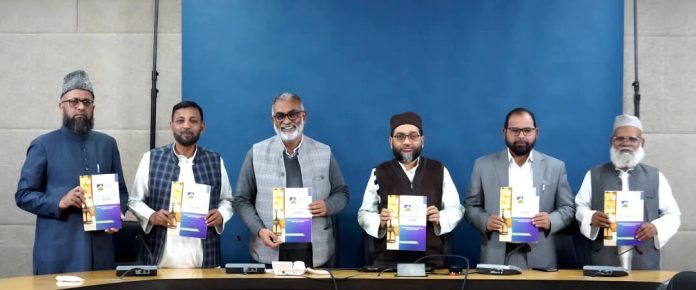New Delhi: Jamaat-e-Islami Hind (JIH) President Syed Sadatullah Husaini has lauded Zakat Center India (ZCI) for its exceptional progress in just three years, commending its efforts in collecting and distributing Zakat to nearly 5,000 beneficiaries, enabling them to achieve financial independence.
Speaking at the ZCI Annual Report 2024 ceremony, he highlighted the significant gap in Zakat contributions within the Indian Muslim community. He noted that while the potential Zakat collection from Indian Muslims is estimated to be one lakh crore rupees, only about 30 thousand crore rupees are currently being collected.
The event was attended by ZCI Chairman S. Ameenul Hasan and Secretary Abdul Jabbar Siddiqi, along with several prominent figures.
ZCI, a non-profit organization, is dedicated to poverty alleviation and social welfare through efficient Zakat utilization, focusing on education, healthcare, livelihood, and community empowerment. Its primary goal is to promote self-reliance and long-term economic stability within the Muslim community.
Mr. Husaini emphasized the importance of both collecting and distributing Zakat while urging Indian Muslims to recognize this religious obligation. Drawing a comparison with the Tablighi Jamaat’s efforts in connecting Muslims to Salat, he encouraged ZCI to actively engage people in fulfilling their duty of Zakat. He reiterated that Zakat is not just an act of worship that purifies wealth but also nurtures the character of the donor and empowers the economically disadvantaged.
ZCI Chairman S. Ameenul Hasan, in his keynote address, praised the center’s rapid growth since its inception. He acknowledged that while ZCI provides small financial assistance ranging from Rs. 20,000 to Rs. 50,000, many in the Muslim community struggle to receive even such modest support. He expressed satisfaction that these funds significantly impact recipients’ lives, enabling them to become financially independent. He called for greater contributions to scale up ZCI’s initiatives, emphasizing that with more funds, the center could expand its reach and increase disbursements.
Sharing his experiences, Hasan mentioned a visit to Hubballi, where around 250 affluent individuals from the business community came together to support ZCI’s mission. He expressed optimism about the center’s future and stressed the importance of sustained growth.
ZCI Secretary Abdul Jabbar Siddiqi highlighted the center’s expansion across more than 20 cities since its establishment in 2022. He outlined its three core focus areas: connecting the poor with employment opportunities, providing scholarships to underprivileged students for higher education, and offering financial assistance to elderly and destitute individuals.
Responding to questions, Siddiqi revealed that ZCI collected approximately 6.2 crore rupees in 2024, a significant increase from previous years. When asked about disbursements, he confirmed that nearly 100% of the collected funds were distributed, with only a small portion allocated for administrative expenses.
He emphasized that ZCI’s initiatives in livelihood support, education, healthcare, and social welfare have empowered thousands of individuals and families over the past three years. While poverty alleviation is primarily a government responsibility, he stressed that the scale of socio-economic challenges requires collective efforts. Alongside leveraging government schemes, ZCI has adopted an institutional approach to address the root causes of poverty.
According to the ZCI Annual Report 2024, the center has supported over 4,923 individuals since its inception. To measure the impact of its programs, ZCI collects feedback from recipients three months after they receive financial assistance. Based on recipient responses, 94.8% felt a stronger connection to the Muslim community, 93.6% reported an increase in faith, and 92.6% acknowledged that the support helped stabilize their finances.
ZCI prioritizes the use of Zakat funds for productive purposes rather than consumptive ones, ensuring long-term benefits for recipients. The organization is supported by a team of around 500 volunteers across India and aims to expand its efforts to 240 zones, covering 67% of the Muslim population in the country.
In its 2024 financial report, ZCI detailed the sector-wise distribution of Zakat funds, with 63% allocated to livelihood support, 18% to food assistance, 13% to education and skill development, and only 6% spent on administrative expenses. Maharashtra recorded the highest number of beneficiaries with 1,050 individuals, followed by Madhya Pradesh with 418 and Bihar with 258.




